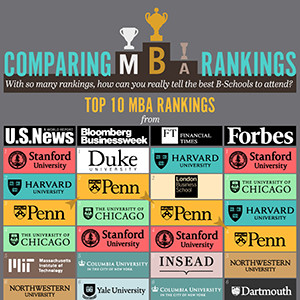Comparing MBA Rankings
With so many MBA rankings out there, how can you really tell the best B-Schools to attend?
US News and World Report Top 10
Stanford University
Harvard University
University of Pennsylvania
University of Chicago
Massachusetts Institute of Technology
Northwestern University
UC Berkeley
Columbia University
Dartmouth College
University of Virginia
Bloomberg Businessweek top 10
Duke University
University of Pennsylvania
University of Chicago
Stanford University
Columbia University
Yale University
Northwestern University
Harvard University
University of Michigan
Carnegie Mellon University
Financial Times Global MBA Top 10
Harvard University
London Business School
University of Pennsylvania
Stanford University
Insead
Columbia University
Iese Business School
Massachusetts Institute of Technology
University of Chicago
UC Berkeley
Forbes Top 10 MBA Programs
Stanford University
University of Chicago
Harvard University
University of Pennsylvania
Northwestern University
Dartmouth College
Columbia University
Duke University
Cornell University
University of Michigan
A number of programs are the ‘best.’ The question is: the best at what?
Ranking Methodologies
US News and World Report MBA Rankings[1]
453 schools surveyed
127 with enough data to be ranked
“Rank not published” schools had rank calculated but were below a cut off
“Unranked” schools did not have numerical rank calculated due to insufficient data
Components:
40% quality assessment
–(2/3) Peer Assessment score
–(1/3) Recruiter assessment score
35% placement success
–(1/2) Starting salary and bonus of graduates
–(1/2) Graduate employment rates
25% student selectivity
–(65%)GMAT and GRE Scores
–(30%)Mean undergraduate GPA
–(5%)Acceptance rate
Bloomberg BusinessWeek MBA Rankings[2]
85 US Schools Ranked
27 International Schools Ranked
75% Current year’s ranking
25% Ranking from two years ago
45% Student survey
–(4/5) student experience
–(1/5) school climate
45% employer survey
–average rating by employers
–number of good ratings it received
10% intellectual capital
–rate of articles in top 20 business journals
Financial Times Global MBA Rankings [3][4]
Ranking Categories:
MBA
EMBA
Master in Finance
Master in Management
Online MBA
Executive Education
European Business Schools
50% current year ranking
25% last year’s ranking
25% ranking from two years ago
20% weighted salary
20% salary increase
10% research quality rank
6% international mobility
5% faculty with doctorates
5% FT doctoral rate
4% international faculty
4% international students
11 factors accounting for less than 4% each:
value for money
career progress
aims achieved
placement success
employed at three months
alumni recommended
female students
women on the board
internationals on the board
international course experience
number of languages taught
Forbes [5]
Surveys graduates at 100+ programs to determine salaries before and up to five years after their program.
100% Return on investment
The Economist MBA Rankings [6]
50% current year rankings
30% last year’s rankings
20% year before lasts rankings
35% new career opportunities
–(1/4) the number of industry sectors recruiting graduates
–(1/4) the percentage of students with jobs three months out
–(1/4) the percentage of jobs found through career services
–(1/4) student assessment of career services
35% personal development and educational experience
–(1/4) Faculty credentials, assessment
–(1/4) student quality
–(1/4) diversity score
–(1/4) student assessment of score
20% increase in salary
–(3/4) post-MBA salary
–(1/4) increase in salary
10% potential to network
Citations:
- http://www.usnews.com/education/best-graduate-schools/articles/business-schools-methodology
- http://www.bloomberg.com/bw/articles/2014-11-10/best-business-schools-2014-methodology-for-ranking-schools
- http://www.ft.com/intl/cms/s/2/75fc5c24-9b1d-11e4-b651-00144feabdc0.html#axzz3eT0a8vTk
- http://www.ft.com/intl/cms/s/2/7935fddc-9b1d-11e4-b651-00144feabdc0.html#axzz3eT0a8vTk
- http://howtomba.com/how-to-find-your-mba/mba-rankings/forbes


